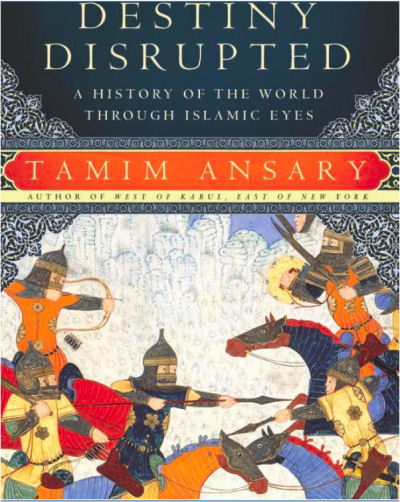Destiny Disrupted - A history of the world through Islamic eyes (Book Review)
Perry Cornish writes about a recent book by an Afghan-born New Yorker who felt there had to be more to history than the Western version. The book explores the theory of protestantism as an enabling force of the Enlightenment because it released Christians from the supervision of Church authorities.
I have recently finished reading this book. It was published in 2009, so I'm a bit behind the times and I would like to see it discussed, so here goes.
The full title is Destiny Disrupted - A history of the world through Islamic eyes by Mir Tamim Ansary.
Tamim is a Muslim, born in Afghanistan. He lives in New York. He was frustrated with the Western bias on recorded history of the last 1500 years since Mohammed's birth, so he researched and wrote this historical view.

Its an excellent read.
I reckon its as important a book as Jarad Diamond's Guns, Germs and Steel in its discussion of cultural and technological evolution, though covers a much shorter time span.
It makes you realise how strongly biased our understanding of the history of the last 2000 years is, and how that has skewed our thinking such that we consider ourselves more mature and advanced than these Eastern cultures.
The most resonating part for me was his discussion of the Protestant Reformation which he argued was a significant reason for the cultural difference between those cultures that are community based, and those that are based on the individual. He discusses why the apparently free and advanced cultures of Europe, with their advanced technologies and
goods was so appealing to the East, but that they were (are still?) culturally not evolved enough to deal with reproducing the culture required to deal with its ramifications.
The Protestant Reformation, freeing science and the individual from having to consider the
community, allowed for the birth of corporations (East India Companies etc).
He describes their practice of not invading but heavily trading with the East Indies and with their advanced technologies, offering themselves as consultants, manipulating local politics and economies to favour their interests, until they basically ran the country. Basically
the same practices that we are fighting against today [in Australia].
He gives a good understanding of the fundamental difference of these two cultural types and how incompatible they are.
He has no bias as to which culture he considers better, but being Muslim, he certainly paints a favourable picture of Muslim culture, and a rather barbarian picture of European culture, pre 1600/1700.
We are taught that about Europe as well but we paint it as being "the Dark Ages" for Europe. He fills in those Dark Ages with a very detailed history of the Middle East that was happening in significant isolation from Europe.
In my own summary of Tamim's views on the Protestant Reformation -
At the end of the crusades the strong, authoritarian hierarchical structure of Catholic church started to crumble. John Wycliffe attacked the organisation, its righteous, powerful control over individuals. He started printing the Bible in English, advocated that all archbishops should be poor.
Martin Luther, German theology professor, tormented by guilt, tried everything his priest suggested to free himself from guilt, but none of it worked. He then realised he would not be free of guilt until he himself believed he was. Which then begged the question - what was the purpose of the priest.
Part of the crusades was the practice of offering indulgences for those going off to fight the Turk. At the end of the crusades, these indulgences had become a way of giving the church money for a ticket to heaven. The church had become quite corrupt. Luther believed the church were extorting bribes to let people into heaven when they had no right at all (according to his recent revelation).
In 1517 he nailed a 95 theses document on the Wittenberg church door stating that salvation was here and now, achieved by faith alone, no intermediary was needed, the Bible was all they needed. It was an overnight sensation that became the Protestant Reformation (PR).
But unlike Islamic reformations, that sparked a new branch of ideology, with a new religious leader etc, the PR was an attack on the authority of the church, a release from its rule. Tamim argues that Christianity is an individualistic religion, based on salvation of the individual soul. Whereas Islam was a plan for how a community should work. So PR was an empowering of the individual, released from the church.
PR enabled the individual to think about God in their own way, and by extension to think about anything in their own way. It freed the individual from having to consider what they were doing/thinking in terms of faith. It allowed Copernicus (and others) to come up with his theories, without having to have it approved by the church.
So Tamim appears to be saying that it was this PR that enabled the Age of Enlightenment to happen, though he doesnt discuss the Age of Enlightenment from my recollection. But he does continue to explain how this new freedom of thought enabled Europeans to race forward in terms of scientific understanding, social freedoms and technological achievements.
From Wikipedia on Age of Enlightenment -
"Russell argues that the enlightenment was ultimately born out of the Protestant reaction against the Catholic counter-reformation, when the philosophical views of the past two centuries crystallized into a coherent world view. He argues that many of the philosophical views, such as affinity for democracy against monarchy, originated among Protestants in the early 16th century to justify their desire to break away from the pope and the Catholic Church. Though many of these philosophical ideals were picked up by Catholics, Russell argues, by the 18th century the Enlightenment was the principal manifestation of the schism that began with Martin Luther"

Recent comments